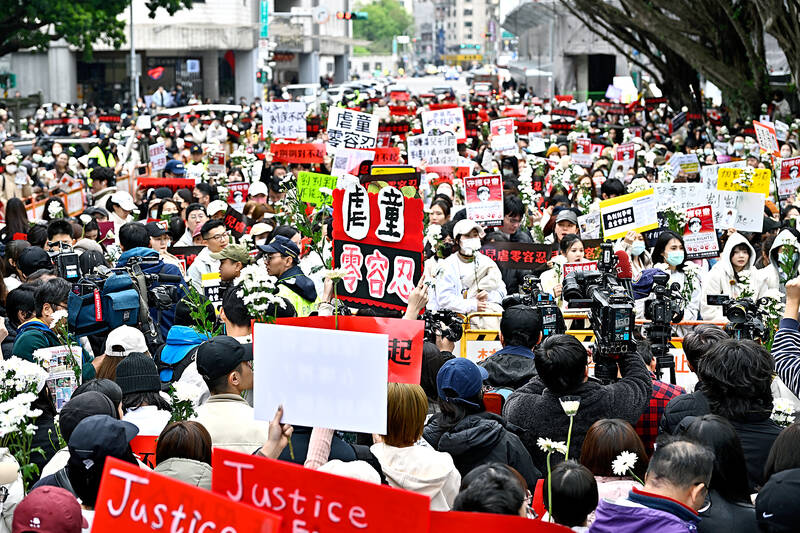The Ministry of Justice yesterday said it aims to submit a draft bill within three months to increase penalties for child abuse, including the possibility of adding the death penalty for abuse resulting in death.
Deputy Minister of Justice Hsu Hsi-hsiang (徐錫祥) mentioned the three-month timeline during a public hearing held by the legislature’s Judiciary and Organic Laws and Statutes Committee, which was attended by children’s advocacy groups and legal experts.
National Yang Ming Chiao Tung University law professor Lin Chih-chieh (林志潔) said the law could be changed to allow the death penalty in child abuse cases that result in death.

Photo: Chen Chih-chu, Taipei Times
The current law already provides the death penalty as the maximum sentence for “intentionally” abusing and killing children.
Li Yu-chun (李侑宭), spokesperson for the Kai Kai online parents group, said her group had six demands, including the creation of a dedicated child protection agency and the introduction of a new offense of “abusive killing of a child” punishable by death or a life sentence without parole.
The Judicial Yuan in a report said that the offense of abusing a young child to death is a result-aggravated crime, not one committed with direct intent.
It cited last year’s Constitutional Judgement No. 8 as stating that such offenses do not qualify as the “most serious crimes” and therefore cannot be punished by death.
It also warned that increasing the statutory maximum penalty to the death sentence could create inconsistencies with Article 271, Paragraph 1 of the Criminal Code, which relates to homicide offenses.
Hsu Ni-ni (徐妮妮), convener of Children Umbrellas, a child protection advocacy group, said that while the current law permits life sentences for abuse resulting in death, the option of parole undermines justice.
Tsai Pei-shan (蔡沛珊), chief prosecutor at the Taoyuan District Prosecutors’ Office, said that denying parole only for those convicted of child abuse could contravene the principle of equality.
Chinese Nationalist Party (KMT) Legislator Wu Tsung-hsien (吳宗憲), who chaired the session, asked the ministry for a timeline for the draft legislation, to which the deputy minister replied that it would be ready to send to the Executive Yuan “within three months.”
The issue of child abuse has been in the spotlight following the high-profile death of Kai Kai (剴剴), a one-year-old boy who was tortured to death by two nannies surnamed Liu (劉), who last week were sentenced to life imprisonment and 18 years respectively.
A survey by the Action Alliance on Basic Education found that 92.1 percent of respondents believed that the current penalties for fatal child abuse are too lenient and should be increased.
The same poll, which was based on 8,724 valid responses collected from Saturday to Wednesday, found that 88.6 percent support mandatory psychological treatment and recidivism assessments for offenders.

A small number of Taiwanese this year lost their citizenship rights after traveling in China and obtaining a one-time Chinese passport to cross the border into Russia, a source said today. The people signed up through Chinese travel agencies for tours of neighboring Russia with companies claiming they could obtain Russian visas and fast-track border clearance, the source said on condition of anonymity. The travelers were actually issued one-time-use Chinese passports, they said. Taiwanese are prohibited from holding a Chinese passport or household registration. If found to have a Chinese ID, they may lose their resident status under Article 9-1

Taiwanese were praised for their composure after a video filmed by Taiwanese tourists capturing the moment a magnitude 7.5 earthquake struck Japan’s Aomori Prefecture went viral on social media. The video shows a hotel room shaking violently amid Monday’s quake, with objects falling to the ground. Two Taiwanese began filming with their mobile phones, while two others held the sides of a TV to prevent it from falling. When the shaking stopped, the pair calmly took down the TV and laid it flat on a tatami mat, the video shows. The video also captured the group talking about the safety of their companions bathing

A classified Pentagon-produced, multiyear assessment — the Overmatch brief — highlighted unreported Chinese capabilities to destroy US military assets and identified US supply chain choke points, painting a disturbing picture of waning US military might, a New York Times editorial published on Monday said. US Secretary of Defense Pete Hegseth’s comments in November last year that “we lose every time” in Pentagon-conducted war games pitting the US against China further highlighted the uncertainty about the US’ capability to intervene in the event of a Chinese invasion of Taiwan. “It shows the Pentagon’s overreliance on expensive, vulnerable weapons as adversaries field cheap, technologically

Starting on Jan. 1, YouBike riders must have insurance to use the service, and a six-month trial of NT$5 coupons under certain conditions would be implemented to balance bike shortages, a joint statement from transportation departments across Taipei, New Taipei City and Taoyuan announced yesterday. The rental bike system operator said that coupons would be offered to riders to rent bikes from full stations, for riders who take out an electric-assisted bike from a full station, and for riders who return a bike to an empty station. All riders with YouBike accounts are automatically eligible for the program, and each membership account